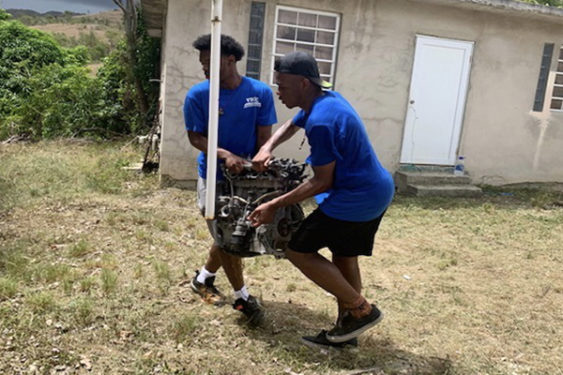
Greetings from sunny central Puerto Rico! I covered a week-long mission trip to Aibonito with a large group of young adults and youth from the Vicariate of Black Catholic Concerns’ Youth Ambassador Program.
On the fifth day of the trip, we made way to San Juan’s Escambron Beach from central Aibonito’s winding roads in the mountains more than an hour away.
At the culmination of observing others for a couple days – from locals who were affected by the hurricane to New York visitors – I thought, ‘what is the source for good to meet the needs of others?’
I was talking with the program director and co- organizer of the trip, Father Dwayne Davis, pastor of St. Thomas Aquinas Church, Flatlands. He was telling me how the ambassador program that the youth participate in provides them with mentorship that goes hand in hand with service and leadership opportunities.
Not only that, but college-ready skills and financial workshops – basically as many tools to prepare them for leadership within the Church and in life in general. So for some of the youth that the program oversees – it helps fill in the gap for those who might not have – whether it’s a father figure, a positive environment void of violence and anger, to something as simple as someone who will help them get a driver’s license.
But the foundation that holds all those opportunities and qualities together is simple: faith.
Prayer, reverence and love for the Church experienced not through some dogma that exists in a textbook (not that such qualities aren’t important) but through the act of encountering
and accompaniment. On mission trips, they will have to get comfortable with the uncomfortable.
Pope Francis said ‘A true missionary is a disciple first’ adding that the Church contributes to the culture of encounter, respects others differences and knows how to find the riches hidden in another person’s diversity.
The youth will have to understand that running water is a privilege, not a right or guarantee. They will have to know that not everyone will speak English even if their English is A+.
But not because they want to make others feel invalid, but as an opportunity to meet people where they are – a moment for humility. So maybe when the New Yorkers go back home and they encounter that person on the subway who doesn’t speak English, that maybe, just maybe, they’ll remember that moment, and grasp some sort of understanding.
Then it hit me: when a pure, true desire for good comes to life and meets the brokenness – whether in ourselves or in others – that is the language of love. Not that we are deserving of that love because we’re perfect. But rather because we’re imperfect.
As I get older, I realize time and energy are sacred. When we give our time and energy to others, it’s because we want to honor that relationship in some sort of way. It’s not religion but a relationship.
Because I’m lost, imperfect and stubborn, I need my relationship with Christ to steer me in some direction that I can’t configure by myself. It’s because I’m in dire need of good that I seek Him who is good, who is Love itself. And I find it through a peace this world doesn’t give or sell in a store aisle or on Amazon.
My hope is that we can all experience the language of love that meets our brokenness with good.
